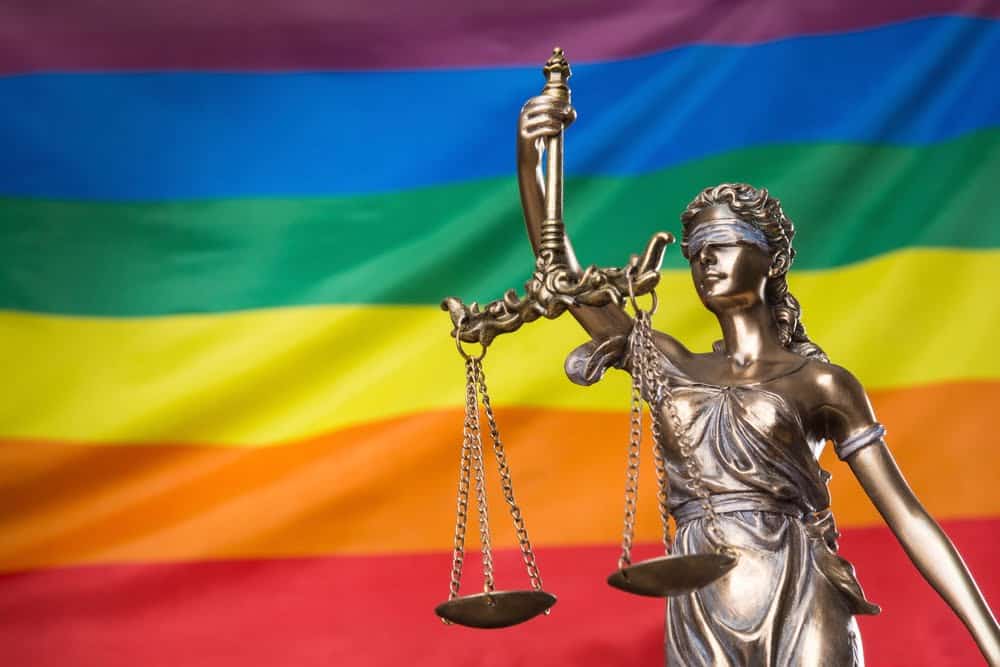Newly sworn in President Donald Trump declared on his first day Monday – however unilaterally – that “it will be the official policy of the United States government that there are only two genders, male and female.” A number of Pennsylvania lawmakers find that declaration troubling.
State House Democratic Whip Rep. Mike Schlossberg of Lehigh County summed it up simply, “I think this is going to be a difficult moment to advance equality and protections. Things like the Fairness Act that would ban legal discrimination? We’ll struggle to pass that right now.”
Pennsylvania House Democrats, during the last biennium, struggled and failed to secure equality – even without an openly anti-gay, anti-trans president in the White House.
The Fairness Act, HB 300, which gained the support of every Bucks County Democrat – and no Bucks County Republicans – was proposed by Rep. Malcolm Kenyatta, a Philadelphia County Democrat. While it passed the lower chamber in the last legislative session, it failed in the Senate.
Still, the grim reality that more than half the Pennsylvania General Assembly opposes equal rights for LGBTQ+ individuals won’t deter Rep. Schlossberg or his co-sponsor, Montgomery County’s Representative Benjamin Sanchez, from protecting individuals perceived to be gay or trans from violent assault without provocation by introducing legislation to prohibit the use of LGBTQ+ panic defense in the state.
Rep. Sanchez summed up his dedication to expanding protections in Pennsylvania, “I don’t think there’s any doubt that right now LGBTQ+ people are at greater risk after the President’s remarks and his Executive Order regarding gender identity that came out [Monday].”
He continued, “They [LGBTQ+] are being disproportionately attacked and it’s our jobs as allies now to step up and stand with them now and always. I didn’t need this sudden jolt of inspiration to continue the fight for what’s right for this community.”
His fears are fact-based. Recent FBI numbers show that hate crimes based on gender identity are on the rise – a startling truth considering violent crime overall is down.
As for the president targeting this community in his speech, Sanchez added, “but sure, the recent activity gave it [a jolt] to me anyway.”
And, while last term’s Fairness Act promised to amend the Pennsylvania Human Relations Act to include sexual orientation, gender identity and expression to the list of protections from discrimination in employment, housing, public accommodation, education and commercial property – Schlossberg and Sanchez acknowledge that expecting some of their Senate colleagues to vote for equality might not be possible at this time.
However, they do hope that their bill banning the “LGBTQ+ panic” defense will receive a better reception among their fellow legislators on both sides of the aisle.
INTERVIEW: Raising a Transgender Child in an Increasingly Transphobic Country, with Brett Freeman
According to the LGBTQ+ Bar Association, the “LGBTQ+ panic” defense (also commonly referred to “gay or trans panic”) “is a legal strategy wherein defendants charged with violent crimes weaponize their victim’s real or perceived sexual orientation or gender identity/expression to reduce or evade criminal liability.”
In other words, a person who commits a violent crime and admits it, may seek legal absolution on the basis that they were provoked or spurred to violence by the sexual orientations or intentions somehow radiating from their victim. As in other diminished capacity defenses, the “LGBTQ+ panic” pleading asserts that the perpetrator may not be held responsible for their actions.
Pennsylvania remains one of the few mid-Atlantic states where it’s safe to use such discrimination as a defense. Nearly every neighboring state bans this legal excuse for committing violent crime. New Jersey, New York, Maryland, Virginia and Delaware have all banned the “LGBTQ+ panic” defense. Only the states to the west, Ohio and West Virginia, allow a person to claim that they injured or killed a person after learning – or guessing – that the victim was LGBTQ+ and that somehow this supposition explained their violent response.
Rep. Schlossberg commented on the Pennsylvania legislature’s recalcitrance to hold people accountable for unprovoked violence against others, “I cannot fathom what the possible delay could be [banning the panic defense]. This really doesn’t seem like a hard one.”
Rep. Sanchez voiced equal dismay. “While it has become slightly less difficult to help guide legislation through the House on topics of human rights, our Senate is still heavily against moving democratic bills to the Governor’s desk. Until both branches of government can work together to move this commonwealth forward, we are at a detrimental impasse.”
For the ban to move forward through both chambers, Sanchez and Schlossberg must secure at least some support from a number of Republicans – several in the Senate. Sanchez thinks that may just happen.
“I think it’ll be an uphill battle, but not impossible. I think of all of my LGBTQ+ Rights legislation that I introduce each year, this one has received the least pushback from the Republican side,” he said. “That being said, it requires everyone to vote on conscience and not by party. I hold hope that that is possible.”
READ: Pennsylvania Takes Important Step to Protect LGBTQ Youth By Repudiating ‘Conversion Therapy’
Last term any such hope would have been misplaced, as every Republican on the Judiciary Committee voted against a ban. And parliamentary procedures allowed for it to die on the House floor before it ever came to a vote of the whole chamber.
Corrine Goodwin, Executive Director of the Eastern PA Trans Equity Project, can’t see the bill passing without the support of individual Pennsylvanians making themselves heard. “Number one is to reach out to their legislator – their Pennsylvania house representative, and their Pennsylvania state senator – and say that they want their legislator to sign on and support this legislation.”
Goodwin believes that individuals who already walk the street without fear of unwarranted assault must demand those same protections for all Pennsylvanians. “You know you don’t have a right to claim a defense that you felt compelled to assault somebody because that somebody was black or because somebody spoke Spanish … so we’re not looking for anything extra. We’re just looking for the same level of rights and protections that other people have.” In summation she adds, “The overall message is that LGBTQ people … deserve to have the same level of protections and rights as any other member of the community.”
READ: As Anti-LGBTQ Backlash Grows, Advocates Say There Is ‘Hope’ In Action
Schlossberg couldn’t agree more. And, at least for now, he believes Pennsylvania can shield her residents – in part – from the changing attitudes in Washington. “Protect from the wort of harms? Absolutely. I think there are people in this commonwealth who are the good guys. They are dedicated to making sure everyone gets to live the life they want.”
Still, the lawmaker acknowledges that the LQBTQ+ Panic Defense Ban is a necessary step in that direction, “I come back to this. My job as an elected official is to make sure that everyone has the same equality and freedom that I have.”
Sanchez concurs. “I have close friends and family who this directly impacts, and I will not abandon them when they need me most. Even if I wasn’t connected to anyone in the LGBTQ+ community, I wouldn’t abandon this issue. I am a dedicated servant of our Constitution, and we are supposed to be a land of the free.”
Allowing someone to get away with assault or murder because of “LGBTQ+ panic” – well the representative adds, “This is not freedom.”







